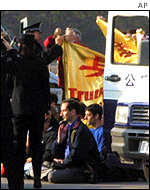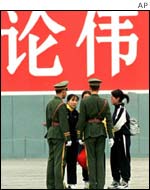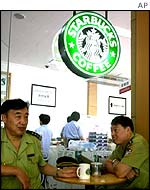Beijing Correspondent

Police often do not want their actions reported
If you stroll down to the Starbucks near my flat in Beijing you will invariably find it packed with well-dressed young Chinese happily sipping their mochas and cappuccinos.
Just across the street rise the familiar golden arches of Macdonald's. Its all very comforting.

China is a mixture of the old and new
Today China is a free wheeling market economy, its top executives are educated at Harvard and Oxford.
Even its [party name omitted] leaders hobnob with Bush and Blair, and talk of free trade and the fight against terror.
Living here it is easy to be lulled in to a sense that China really has changed.
But then something happens that brings you shuddering back down to earth with a bump.
Two weeks ago I woke up to just such an event.
As I walked to work a black sedan slipped out of a side street and began crawling along a few meters behind me.
Outside the BBC office there was another.
Through its dark tinted glass I could just make out the shapes of four thickset men eyeing me closely.
Tiananmen protest
What on earth is going on? I thought.
As the morning wore on it started to become clear.
Media reports said 14 foreign members of the Falun Gong religious [group] had been arrested in a Beijing hotel.
Then came an anonymous call.
"There will be a protest in Tiananmen Square," the caller said and hung up.
We leapt into the car. As we pulled out of the office not one, not two, but three black sedans swept out behind us.
On Tiananmen Square the security was like I had never seen before.

Western protesters have been detained on several occasions in recent months
Scores of uniformed police were there, along with literally hundreds of plainclothes police - young tough looking men all with the same crew-cuts and mobile phones.
As I stood and watched small groups of foreign protesters unfurled banners and began chanting: "Falun Gong is good! Stop the repression!"

Suspected Falun Gong members are often arrested
From the four corners of the square, hundreds of police began running.
In minutes it was over, the protesters tackled to the ground and hauled away to waiting police vans.
I began walking back to the BBC car to file my report.
Police interrogation
But as I passed the huge Stalinist history museum on the east side of the square a police car squealed to a halt beside me.
Two men and a woman leapt out.
"What are you doing?" They demanded.
"Nothing," I said.
"You must come with us," they insisted.
"Why?" I asked, my hackles beginning to rise. "I haven't done anything".
"It doesn't matter. You must come with us."
I was taken to a nearby police station and frog marched in to an interrogation room.
Several other foreign journalists were already there. I began chatting to one.
"Stop talking," one of the policemen shouted.
"What do you mean?" I said. "You can't order me to stop talking."
"I can tell you what I like," he shouted back. "I am the police!"
I told him he was being stupid - probably not the most sensible thing to do.
He strode up grabbed me by the throat and shoved me against the wall glowering.
My stomach tightened. For a moment I really thought he would hit me.
"Who are you calling stupid?" he sneered, his face inches from mine.
"You have carried out an illegal activity.
"Did you apply to go to Tiananmen Square? Why were you there? Who told you to go?"
The barrage of questioning continued for two hours.
Intimidation
They tried to get me to sign a confession admitting I had broken China's laws by going to the square.
I refused. Eventually I was allowed to go.
Outside the BBC office the black sedans were back in place.
For the next few days they followed me everywhere I went - to Starbucks for coffee, even when I went to the park with my son.
The thickset men were never far away. They made no attempt to hide - if anything they did the opposite.
The idea was to intimidate, to prevent me doing my job as a journalist.

Police are present even in Starbucks
It was a minor irritation, and after a few days they went away - at least for now.
But the incident said much about the nature of China's system.
Secret files
Chinese who dare to criticise or challenge the government face it every day.
One prominent dissident I know has had a team of police watching her for 10 years.
Wherever she goes, whatever she does, they are always there in the background.
But it is not just dissidents. The system of control goes deeper.
The Chinese state holds a personal dossier on every single one of its citizens - its called a Dang An.
You can never see it - you don't know what it contains - but it can control your destiny.
A black mark against you - a bad school report, a disagreement with your boss, a visit to a psychiatrist - all can travel with you for the rest of your life.
One person I know once caught a glimpse of her Dang An.
In it was a pink slip of paper she recognised as coming from her Primary school.
Things she had done as an eight-year-old child are still following her more than 20 years later.
Until that changes, the fancy coffee shops and skyscrapers of Beijing will remain a veneer for a police state that relies on coercion and fear to maintain control.
Category: Falun Dafa in the Media





